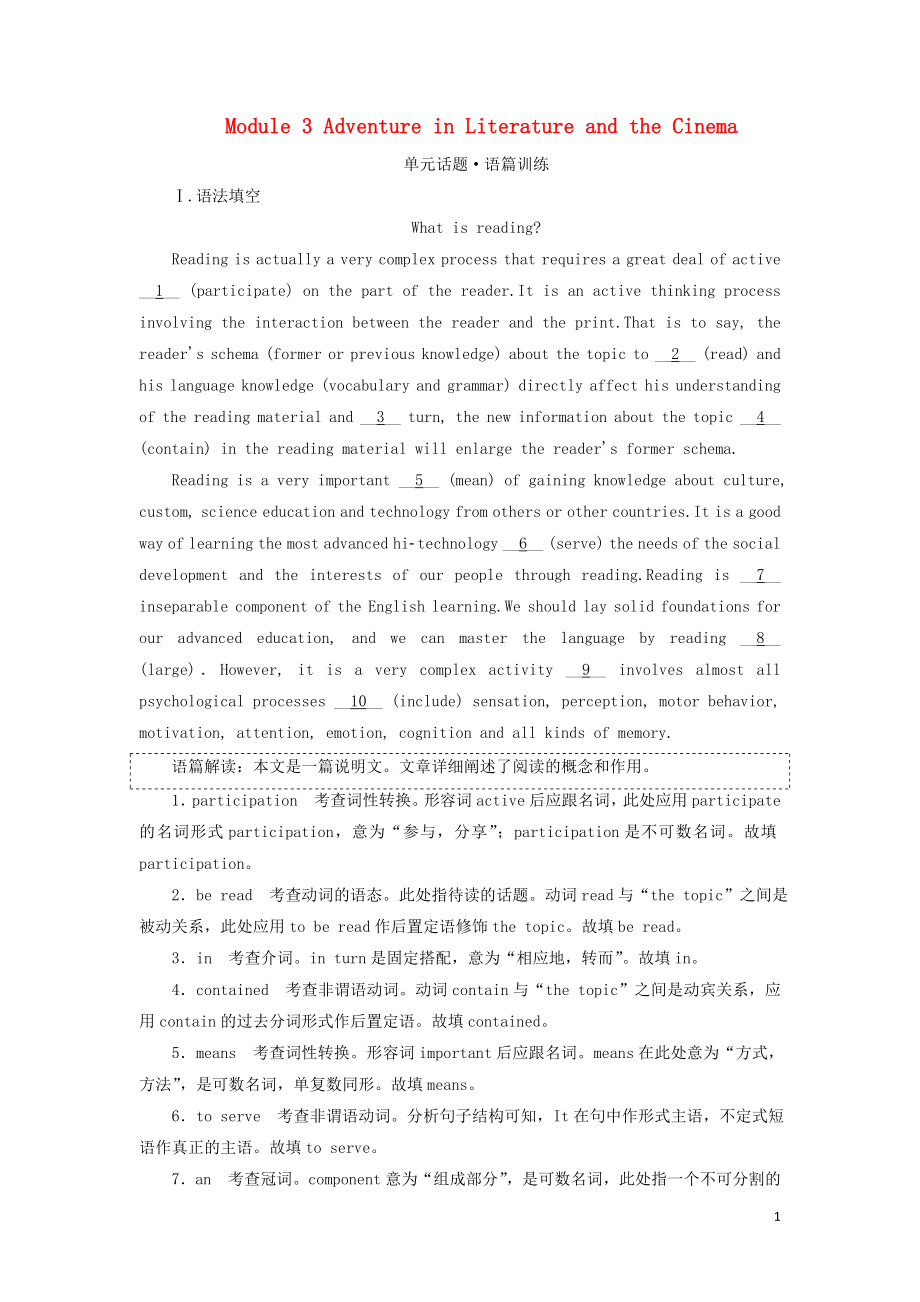《(新課改)2020版高考英語一輪復(fù)習(xí) Module 3 Adventure in Literature and the Cinema單元話題 語篇訓(xùn)練(含解析)外研版必修5》由會員分享����,可在線閱讀,更多相關(guān)《(新課改)2020版高考英語一輪復(fù)習(xí) Module 3 Adventure in Literature and the Cinema單元話題 語篇訓(xùn)練(含解析)外研版必修5(4頁珍藏版)》請?jiān)谘b配圖網(wǎng)上搜索���。
1���、Module 3 Adventure in Literature and the Cinema
單元話題·語篇訓(xùn)練
Ⅰ.語法填空
What is reading?
Reading is actually a very complex process that requires a great deal of active __1__ (participate) on the part of the reader.It is an active thinking process involving the interaction between the reader and the pr
2���、int.That is to say, the reader's schema (former or previous knowledge) about the topic to __2__ (read) and his language knowledge (vocabulary and grammar) directly affect his understanding of the reading material and __3__ turn, the new information about the topic __4__ (contain) in the reading mate
3、rial will enlarge the reader's former schema.
Reading is a very important __5__ (mean) of gaining knowledge about culture, custom, science education and technology from others or other countries.It is a good way of learning the most advanced hi-technology __6__ (serve) the needs of the social devel
4����、opment and the interests of our people through reading.Reading is __7__ inseparable component of the English learning.We should lay solid foundations for our advanced education, and we can master the language by reading __8__ (large).However, it is a very complex activity __9__ involves almost all p
5、sychological processes __10__ (include) sensation, perception, motor behavior, motivation, attention, emotion, cognition and all kinds of memory.
語篇解讀:本文是一篇說明文���。文章詳細(xì)闡述了閱讀的概念和作用����。
1.participation 考查詞性轉(zhuǎn)換���。形容詞active后應(yīng)跟名詞����,此處應(yīng)用participate的名詞形式participation���,意為“參與���,分享”�����;participation是不可數(shù)名詞。故填participation�����。
2
6�����、.be read 考查動詞的語態(tài)����。此處指待讀的話題。動詞read與“the topic”之間是被動關(guān)系����,此處應(yīng)用to be read作后置定語修飾the topic。故填be read����。
3.in 考查介詞����。in turn是固定搭配���,意為“相應(yīng)地���,轉(zhuǎn)而”。故填in�����。
4.contained 考查非謂語動詞�����。動詞contain與“the topic”之間是動賓關(guān)系����,應(yīng)用contain的過去分詞形式作后置定語。故填contained���。
5.means 考查詞性轉(zhuǎn)換���。形容詞important后應(yīng)跟名詞���。means在此處意為“方式,方法”���,是可數(shù)名詞����,單復(fù)數(shù)同形����。故填means�����。
6.to s
7���、erve 考查非謂語動詞����。分析句子結(jié)構(gòu)可知�����,It在句中作形式主語,不定式短語作真正的主語�����。故填to serve����。
7.a(chǎn)n 考查冠詞。component意為“組成部分”�����,是可數(shù)名詞���,此處指一個(gè)不可分割的組成部分�����,表示泛指����;且inseparable的讀音以元音音素開頭�����,其前應(yīng)用不定冠詞an。故填an���。
8.largely 考查詞性轉(zhuǎn)換����。此處應(yīng)用副詞largely修飾動詞“reading”���。故填largely����。
9.that/which 考查定語從句����。分析句子結(jié)構(gòu)可知����,空格處引導(dǎo)定語從句,在從句中作主語����,先行詞是activity,指物,應(yīng)用關(guān)系代詞that或which來引導(dǎo)該從句�����。故填tha
8���、t/which�����。
10.including 考查介詞����。此處指閱讀是一個(gè)非常復(fù)雜的活動���,它涉及了幾乎所有的心理學(xué)過程����,包括感覺����、洞察力、運(yùn)動行為�����、動機(jī)、注意力���、情感����、認(rèn)知能力和各種各樣的記憶力���。including是介詞����,和其后的名詞/代詞一起形成介賓短語���,意為“包括……”�����。故填including。
Ⅱ.讀后續(xù)寫
閱讀下面短文����,根據(jù)所給情節(jié)進(jìn)行續(xù)寫,使之構(gòu)成一個(gè)完整的故事。
It was an Art lesson. Rachel sat at the desk watching her classmates preparing the water jars and paints. She
9����、 understood why Mrs.Weston asked her to sit down and got Lisa to fetch everything for her. It was always a disaster when Rachel tried to do Art!
Rachel sighed and reached out to dip her brush in some black paint and — oh, no! She knocked over the jar. The water spread across the desk and drowne
10、d the paper. Lisa called Mrs. Weston to see what Rachel had done. Rachel went red in the face. She jumped to her feet to get a cloth. Her chair fell over backwards. She turned round and her paintbrush caught Lisa across the face, giving her a black moustache. Lisa was so surprised that she fell back
11����、 against a wire bookstand. It came crashing down and the books went all over the floor.
How clumsy! Rachel thought as she went home on the bus. The bus stopped outside her house. She jumped up and her elbow (肘部) knocked a woman's hat right over her eyes. Oh, no! Rachel said sorry, got off and r
12、an indoors. Mum wasn't in the kitchen but lay in bed as she caught an awful cold. Rachel offered to make a cup of tea but Mum would rather wait for Dad. Rachel sighed. She understood Mum was afraid she would spill (灑出) it.
“But would you go to Mrs.Willow for some cold cures���?” asked Mum. Rachel
13����、turned to the door at once. “But Rachel, Mrs.Willow's house is full of beautiful things, so if she asks you to come in, you'd better say no.” Rachel sighed and ran out.
Mrs.Willow was an old lady with white hair and sharp_blue_eyes living in an old house. She opened the door and invited Rachel
14����、in. Rachel said why she came and that she preferred to wait outside remembering her mother's warning. Mrs.Willow insisted Rachel come inside. Rachel took a deep breath and stepped in. She looked round Mrs.Willow's sitting room and saw at once why Mum had been worried.
注意:1.所續(xù)寫短文的詞數(shù)應(yīng)為150左右;
2.至少使用5
15���、個(gè)短文中標(biāo)有下劃線的關(guān)鍵詞語�����;
3.續(xù)寫部分分為兩段���,每段的開頭語已為你寫好����;
4.續(xù)寫完成后����,請用下劃線標(biāo)出你所使用的關(guān)鍵詞語。
Paragraph 1:
There were beautiful things everywhere — pretty china figures and delicate vases.
16�����、
Paragraph 2:
With a smile Mrs.Willow comforted her saying it had been broken before.
17���、
參考范文:
Paragraph 1:
There were beautiful things everywhere — pretty china figures and delicate vases
18���、. Rachel stood very still, afraid of knocking something over. Mrs.Willow handed Rachel a small brown bottle of cold cure. Rachel couldn't wait to get away, feeling any minute there would be a disaster. She thanked her and turned to the door when something brushed against her leg. Rachel was so surpr
19、ised that she jumped backwards. It was a cat! But her elbow hit a vase and it fell to the floor, broken. How awkward!
Paragraph 2:
With a smile Mrs.Willow comforted her saying it had been broken before. Rachel sighed and stared at her. “I did, when I was young. You couldn't have been as clumsy as
20���、 I was�����,” Willow said, her sharp_blue_eyes shining. “Keep telling yourself you can manage it and it will work.” Rachel doubtfully said that several times. After they cleared up the vase, they drank tea from china cups and ate cakes off delicate plates and Rachel didn't break another thing. It was a kind of magic. Rachel smiled.
4
 (新課改)2020版高考英語一輪復(fù)習(xí) Module 3 Adventure in Literature and the Cinema單元話題 語篇訓(xùn)練(含解析)外研版必修5
(新課改)2020版高考英語一輪復(fù)習(xí) Module 3 Adventure in Literature and the Cinema單元話題 語篇訓(xùn)練(含解析)外研版必修5

